General, Sir John Monash, Personal Files Book 22, 1 February - 10 April 1919- Part 11

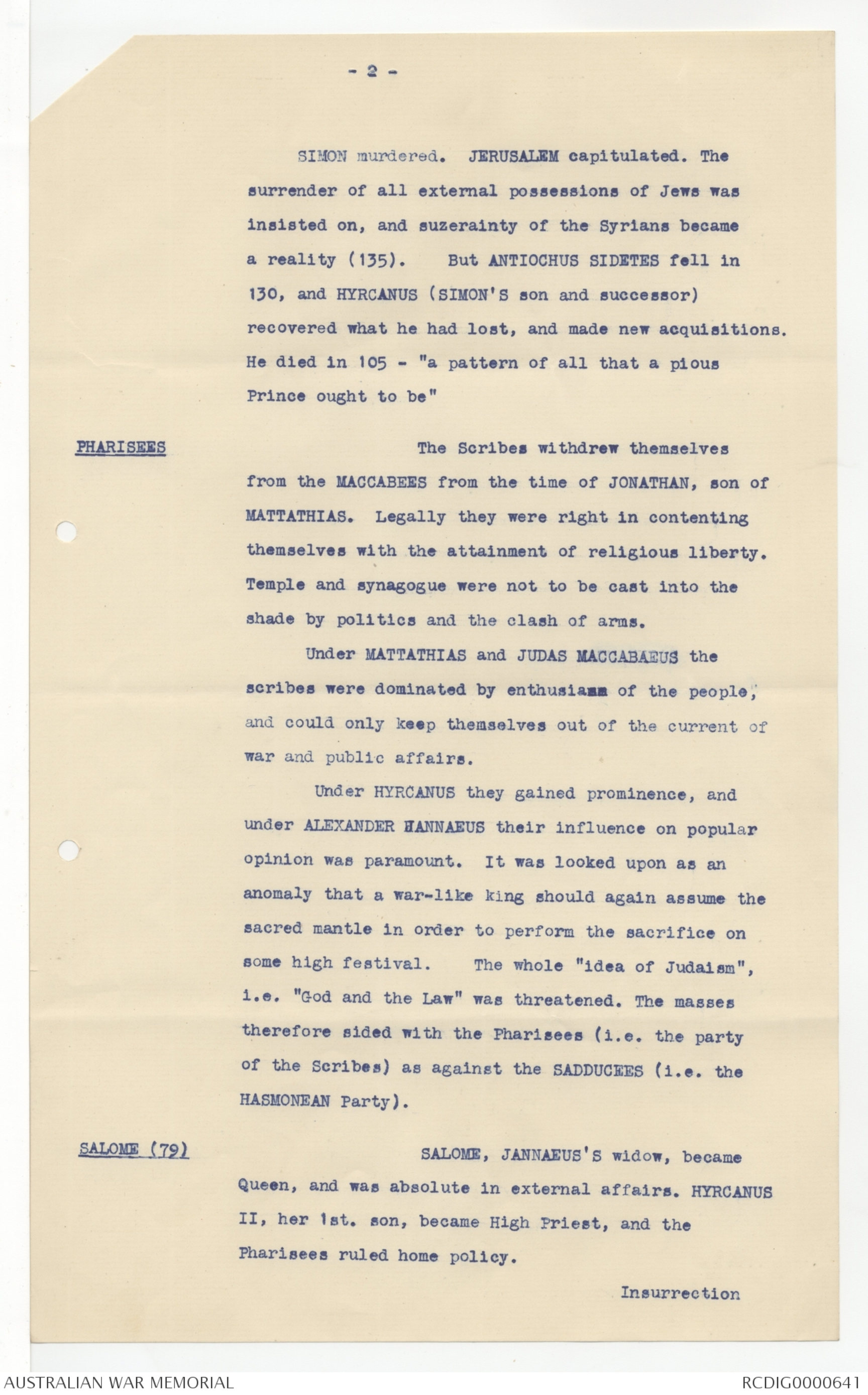
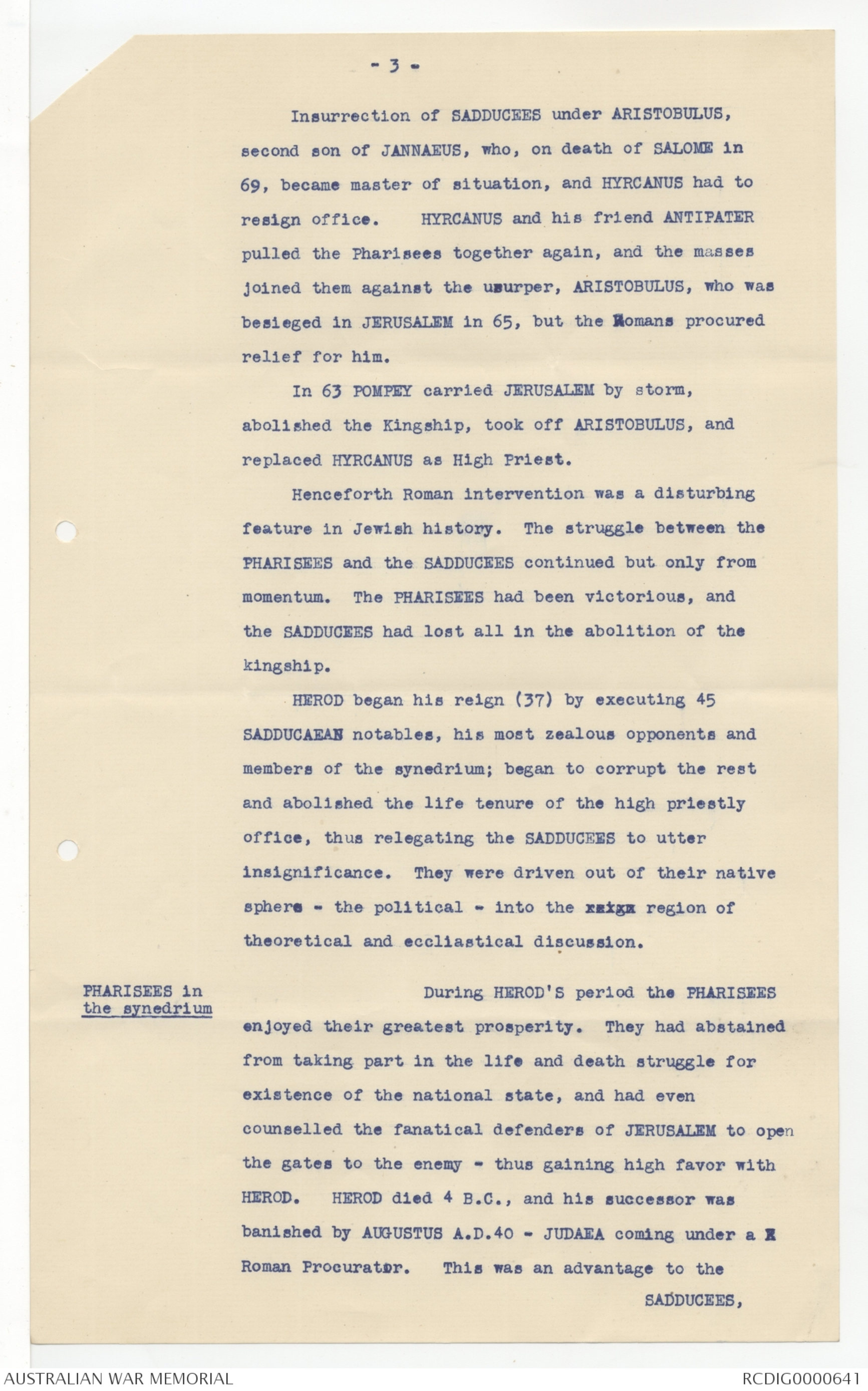
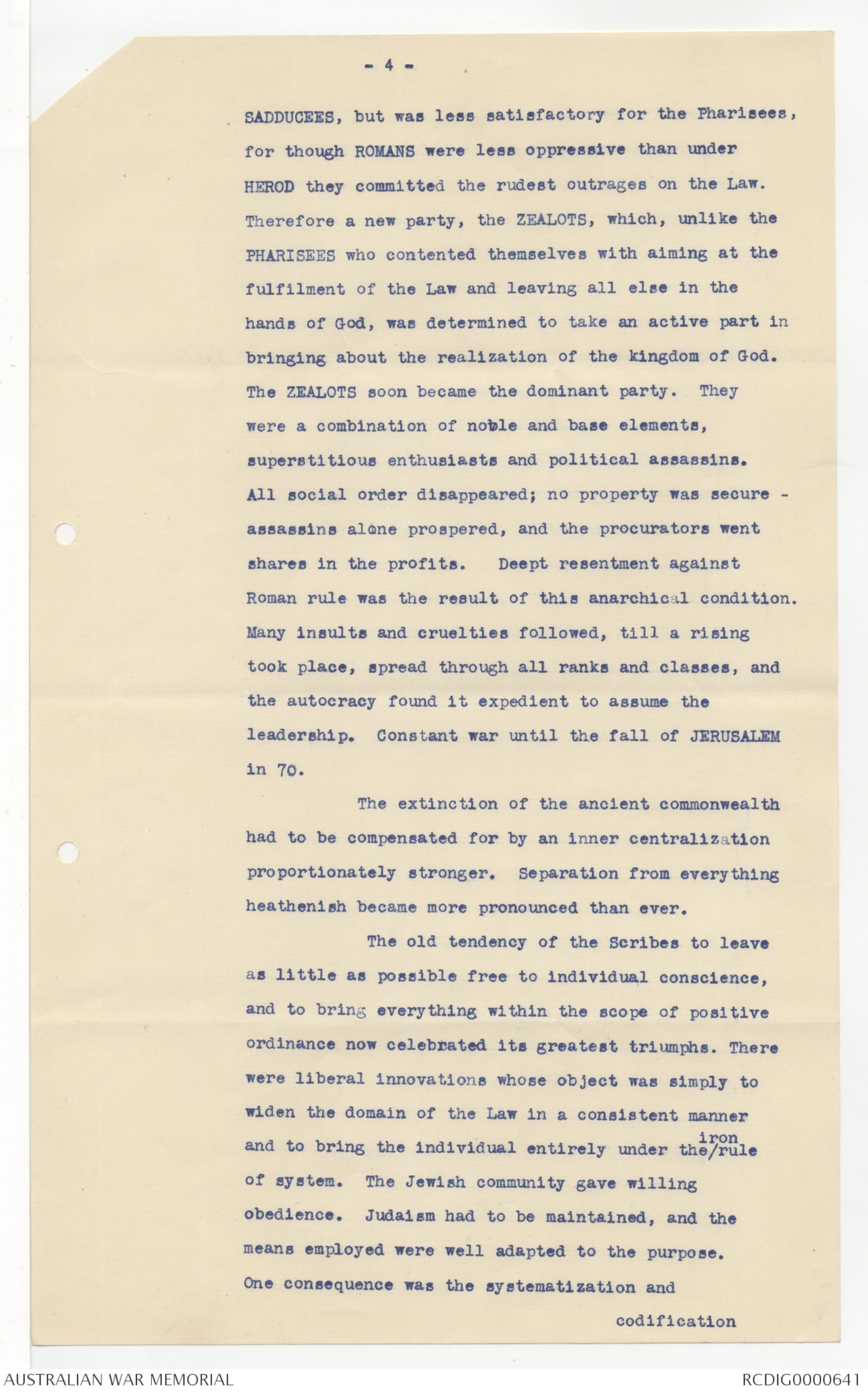
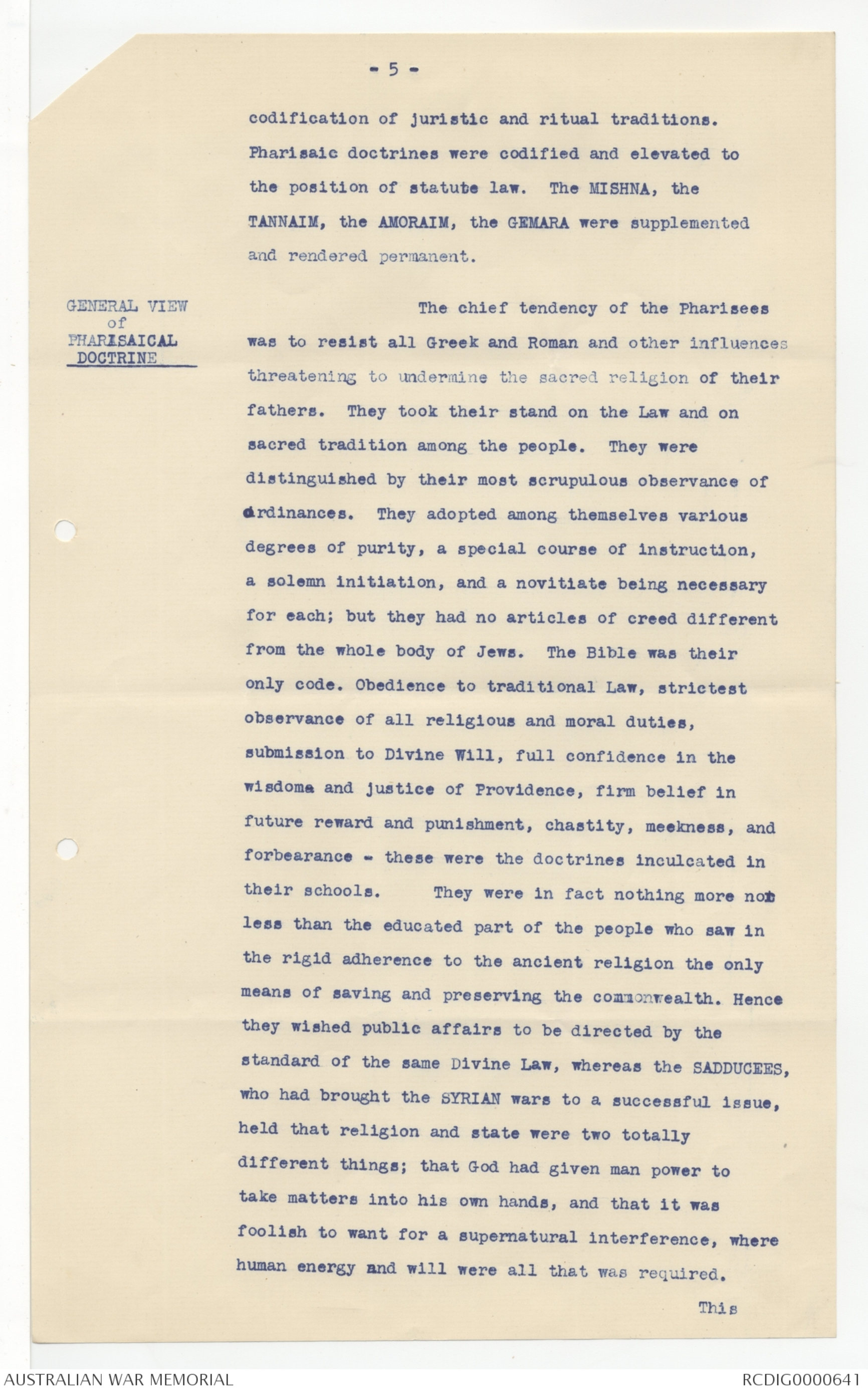
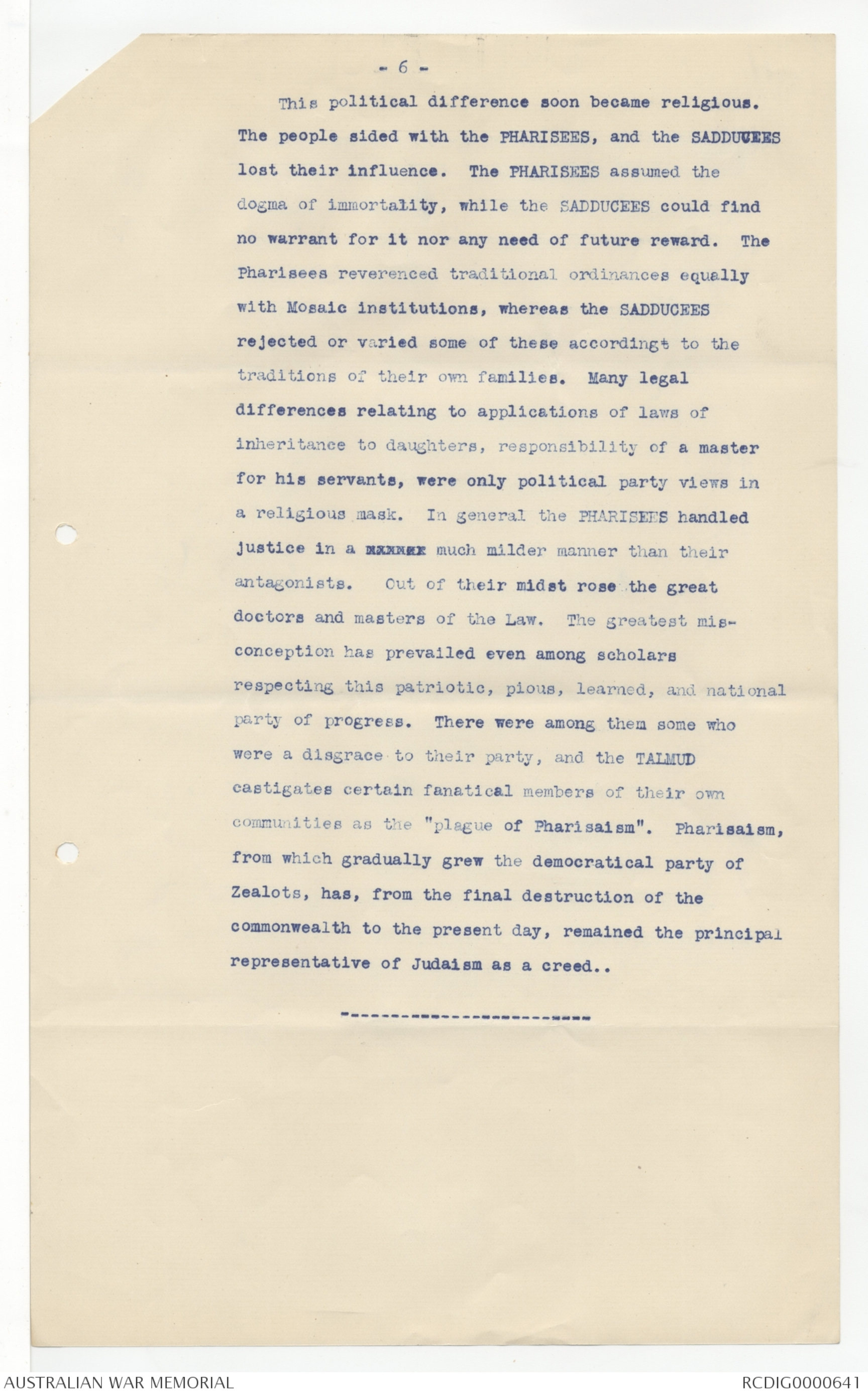
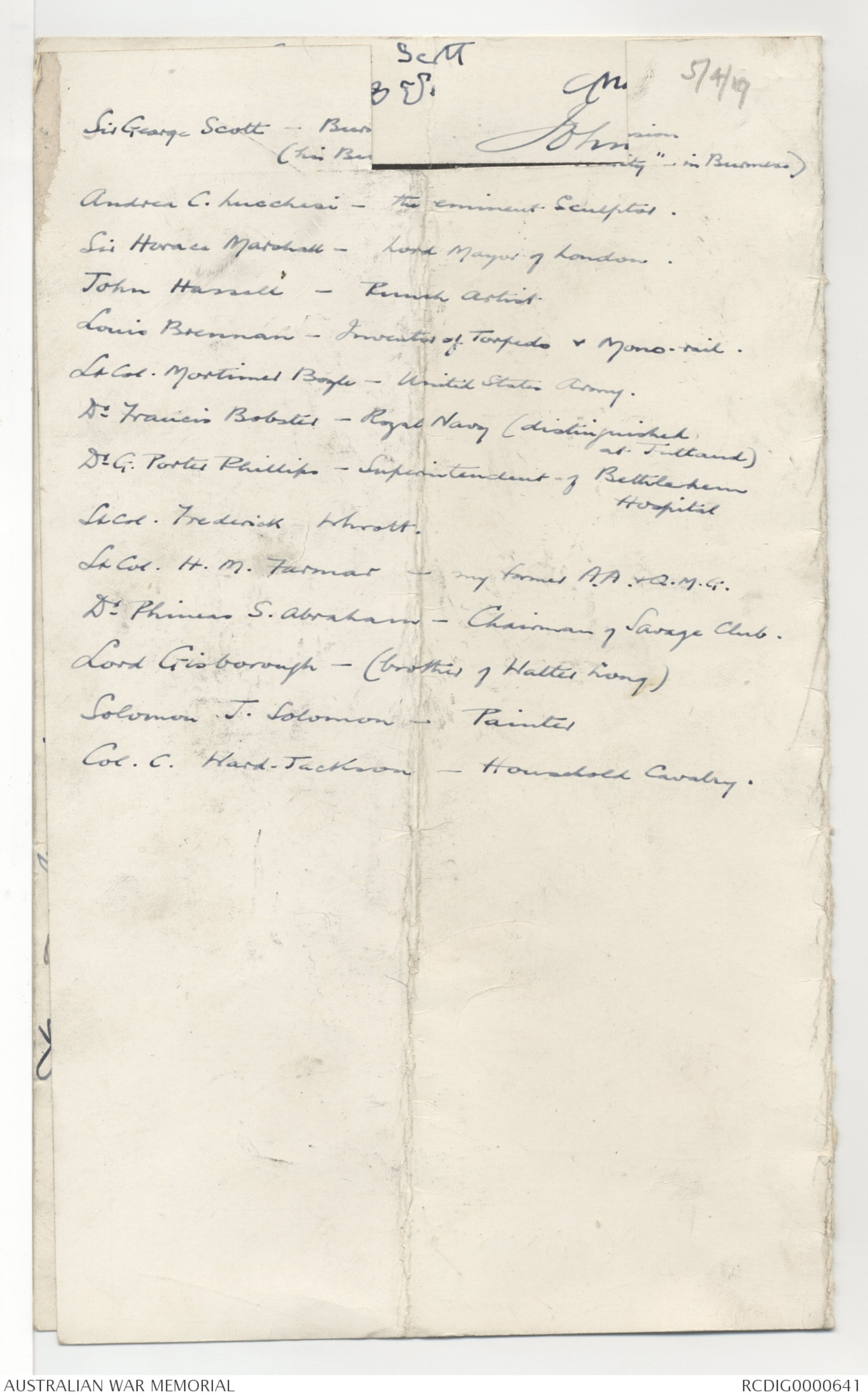
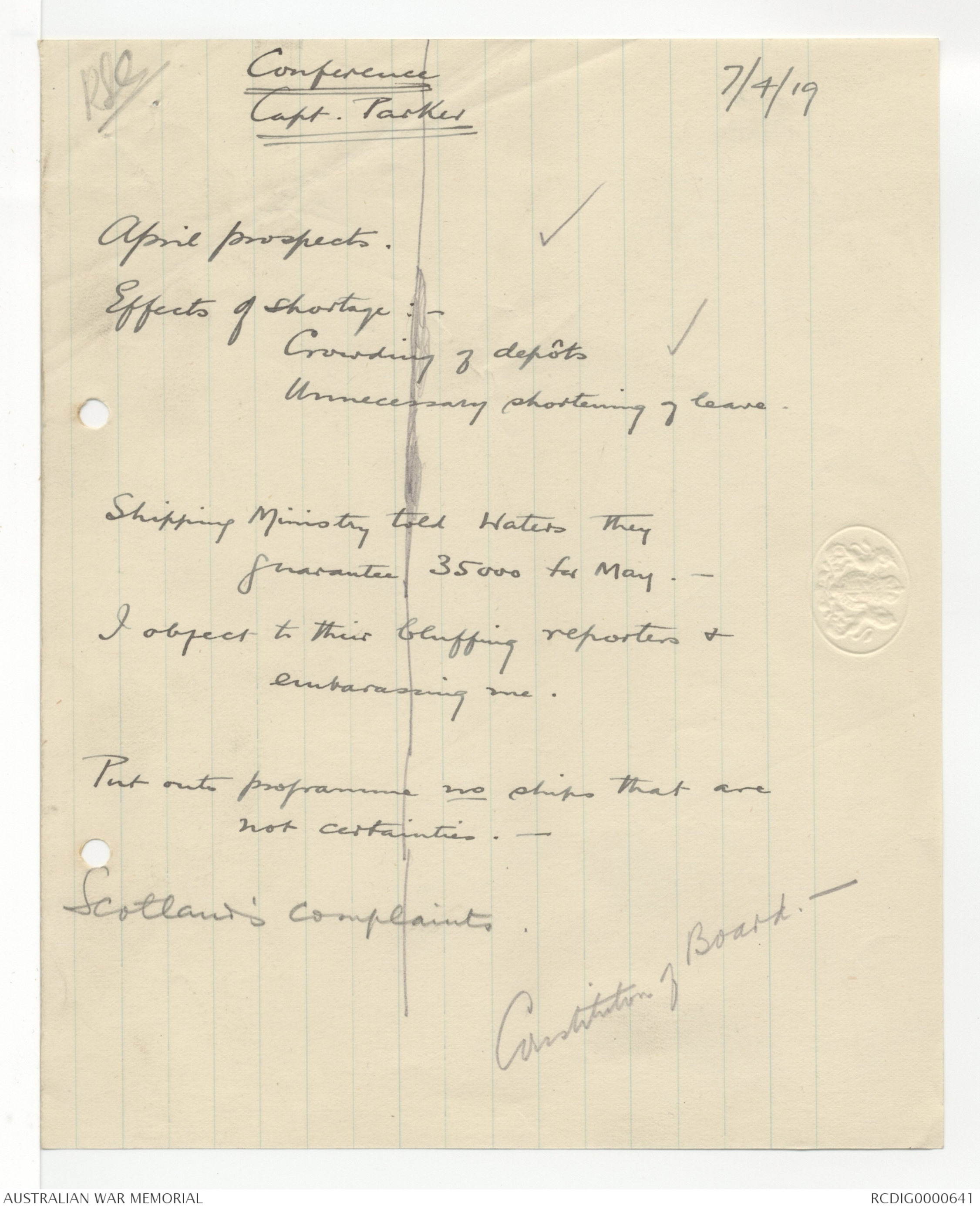
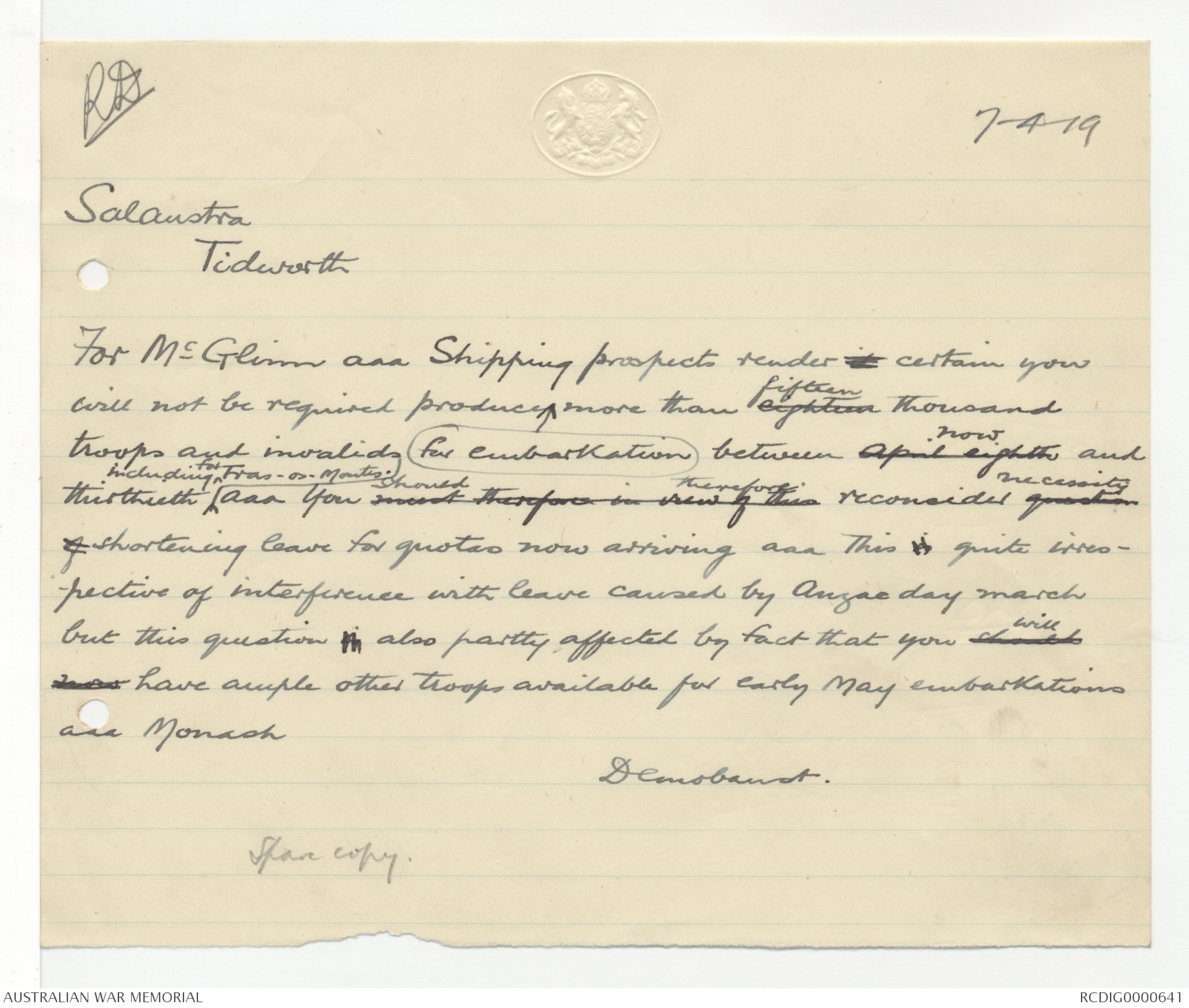
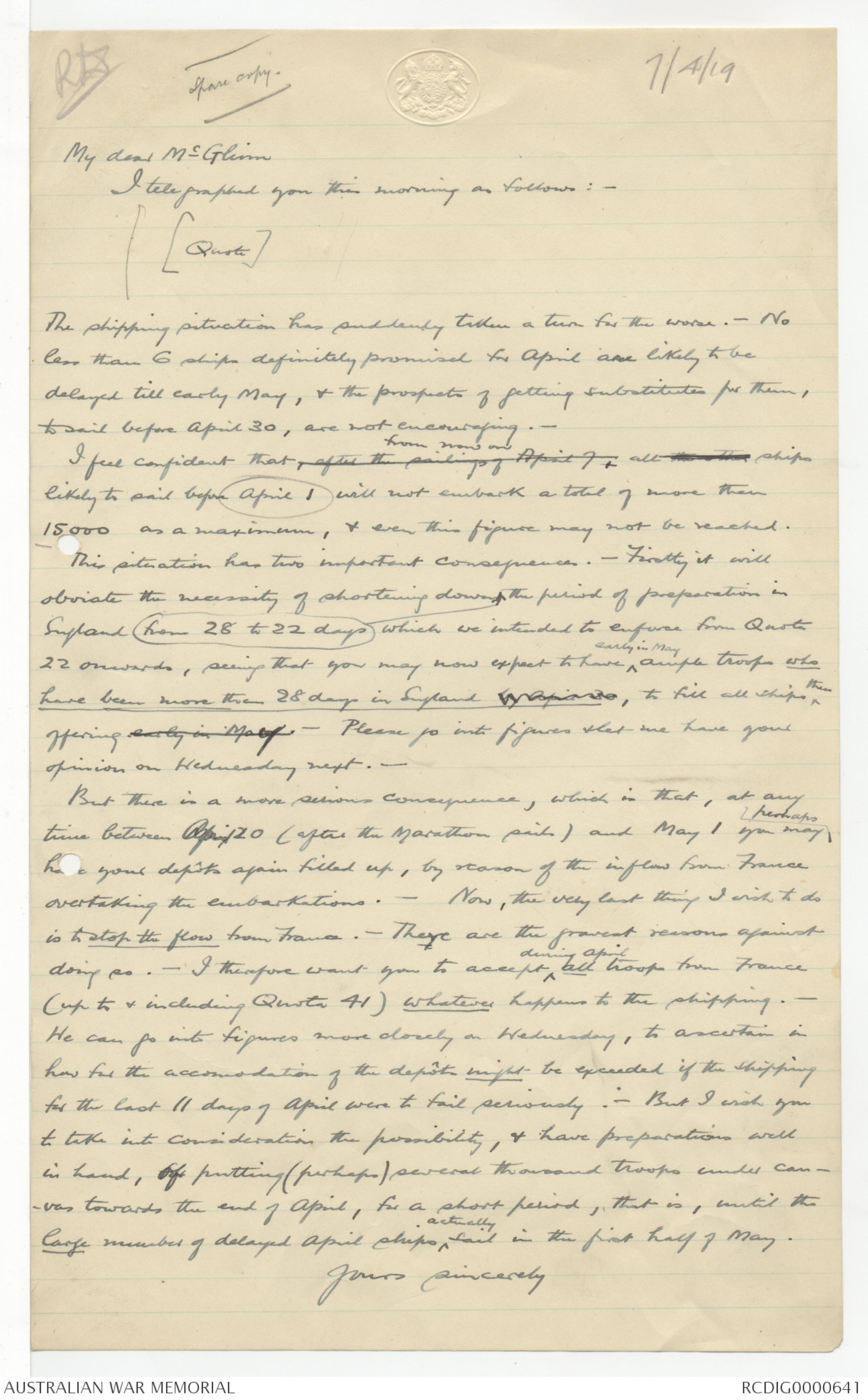
Per Gen. McNicoll\ 4/4/19
---- NOTES OF THE PHARISEES ----
SCRIBE Godified the Torah - laid foundations
for a supplementary edition, advancing with
progressive requirements of life - numerous social
class, whose influence exceeded that of the priests.
PTOLEMY 300 B.C. - Torah translated into Greek;
I and II extension of Jewish-Greek literature sprang up.
GROWTH of The upper classes endeavoured to conceal
HELLENISM their Jewishness in the presenceof the refined Greeks.
ANTIOCHUS ANTIOCHUS endeavoured to continue process
of Hellenization (168). JERUSALEM was therefore
abandoned by its inhabitants, who fled to EGYPT, and
hid in deserts and caves. The Scribe held out
specially strongly.
MATTATHIAS MATTATHIAS (Father of JUDAS MACCABAEUS)
became head of a band determined to defend their
ancestral religion with the word.
JUDAS MACCABAEUS JUDAS MACCABAEUS succeeded - struggle
assumed larger dimensions (166-165). Jews held their
own. JERUSALEM worship restored to its previous condition.
LYSIAS, the LYSIAS, the regent, granted a charter of
REGENT religious freedom to the Jews. Religious war
continued - for the supremacy and not for the faith.
JONATHAN JONATHAN made High Priest; then captured
and executed by TRYPHO,who failed to defeat SIMON
(last remaining brother of JUDAS MACCABAEUS) who
became High Priest and under whose reign agriculture,
industry, and commerce flourished, and peaceful
progress resulted from a successful war (140).
SIMON murdered .......
-2-
SIMON murdered. JERUSELAM capitulated. The
surrender of all external possessions of Jews was
insisted on, and suzerainty of the Syrians became
a reality (135). But ANTIOCHUS SIDETES fell in
130, and HYRCANUS (SIMON's son and successor)
recovered what he had lost, and made new acquisitions.
He died in 105 - "a pattern of all that a pious
Prince ought to be"
PHARISEES The Scribes withdrew themselves
from the MACCABEES from the time of JONATHAN, son of
MATTATHIAS. Legally they were right in contenting
themselves with the attainment of religious liberty.
Temple and synagogue were not to be cast into the
shade by politics and clash of arms.
Under MATTATHIAS and JUDAS MACCABAEUS the
scribes were dominated by enthusiasm of the people,
and could only keep themselves out of the current of
war and public affairs.
Under HYRCANUS they gained prominence, and
under ALEXANDER HANNAEUS their influence on popular
opinion was paramount. It was looked upon as an
anomaly that a war-like king should again assume the
sacred mantle in order to perform the sacrifice on
some high festival. The whole "idea of Judaism",
i.e. "God and the Law" was threatened. The masses
therefore sided with the Pharisees (i.e. the party
of the Scribes) as against the SADDUCEES (i.e. the
(HASMONEAN Party).
SALOME (79) SALOME, JANNANUS'S widow, became
Queen, and was absolute in external affairs. HYRCANUS
II, her 1st son, became High Priest, and the
Pharisees ruled home policy.
Insurrection
-3-
Insurrection of SADDUCEES under ARISTOBULUS,
second son of JANNAEUS, who, on death of SALOME in
69, became master of situation and HYRCANUS had to
reign office. HYRCANNUS and his friend ANTIPATER
pulled the Pharisees together again, and the masses
joined them against the usurper, ARISTOBULUS, who was
besieged in JERUSALEM IN 65, but the Romans procured
relief for him.
In 63 POMPEY carried JERUSALEM by storm,
abolished the Kingship, took off ARISTOBULUS, and
replaced HYRCANUS as High Priest.
Henceforth Roman intervention was a disturbing
feature in Jewish history. The struggle between the
PHARISEES and the SADDUCEES continued but only from
momentum. The PHARISEES had been victorious, and
the SADDUCEES had lost all in the abolition of the
kingship.
HEROD began his reign (37) by executing 45
SADDUCEAN notables, his most zealous opponents and
members of the synedrium; began to corrupt the rest
and abolished the life tenure of the high priestly
office, thus relegating the SADDUCEES to utter
insignificance. They were driven out of their native
sphere - the political - into the reign region of
theoretical and ecclesiastical discussion.
PHARISEES in During HEROD'S period the PHARISEES
the synedrium enjoyed their greatest prosperity. The had abstained
from taking part in the life and death struggle for
existence of the national state, and had even
counselled the fanatical defenders of JERUSALEM to open
the gates to the enemy - thus gaining high favor with
HEROD. HEROD died 4 B.C., and his successor was
banished by AUGUSTUS A.D.40 - JUDEA coming un a X
Roman Procurator. This was and advantage to
SADDUCEES,
-4-
SADDUCEES, but was less satisfactory for the Pharisees,
for though ROMANS were less oppressive than under
HEROD they committed the rudest outrages on the Law.
Therefore a new party, the ZEALOTS, which, unlike the
PHARISEES who contented themselves with aiming at the
fulfilment of the Law and leaving all else in the
hands of God, was determined to take an active part in
bringing about the realization of the kingdom of God.
The ZEALOTS soon became the dominant party. They
were a combination of noble and base elements,
superastitious enthusiasts and political assassins.
All social order disappeared; no property was secure -
assassins alone prospered, and the procurators went
shares in the profits. Deept resentment against
Roman rule was the result of this anarchical condition.
Many insults and cruelties followed, till a rising
took place, spread through all ranks and classes, and
the autocracy found it expedient to assume the
leadership. Constant war until the fall of JERUSALEM
in 70.
The extinction of the ancient commonwealth
had to be compensated for by an inner centralization
proportionately stronger. Separation from everything
heathenish became more pronounced than ever.
The old tendency of the Scribe to leave
as little as possible free to individual conscience,
and bring everything within scope of positive
ordinance now celebrated its greatest triumphs. There
were liberal innovations whose object was simply to
widen the domain of the Law in a consistent manner
and to bring the individual entirely under the ^iron/ rule
of system. The Jewish community gave willing
obedience. Judaism had to be maintained, and the
means employed were well adapted to the purpose.
One consequence was the systematization and
codification
-5-
codification of juristic and ritual traditions.
Pharisaic doctrines were codified and elevated to
the position of statute law. The MISHNA, the
TANNAIM, the AMORIAN, the GEMARA were supplemented
and rendered permanent.
GENERAL VIEW The chief tendency of the Pharisees
of was to resist all Greek and Roman and other influences
PHARAISICAL threatening to undermine the sacred religion of their
DOCTRINES fathers. They took their stand on the Law and on
sacred tradition among the people. They were
distinguished by their most scrupulous observance of
ordinances. They adopted among themselves various
degrees of purity, a special course of instruction,
a solemn initiation, and a novitiate being necessary
for each; but they had no articles of creed different
from the whole body of Jews. The Bible was their
only code. Obedience to traditional Law, strictest
observances of all religious and moral duties,
submission to Divine Will, full confidence in the
wisdome and justice of Providence, firm belief in
future reward and punishment, chastity, meekness, and
forbearance - these were the doctrines inculcated in
their schools. They were in fact nothing more nor
less than the educated part of the people who saw in
the rigid adherence to the ancient religion the only
means of saving and preserving the commonwealth. Hence
they wished public affairs to be directed by the
standard of the same Divine Law, whereas the SADDUCEES,
who had brought the SYRIAN wars to a successful issue,
held that religion and state were two totally
different things; that God had given man power to
take matters into his own hands, and that it was
foolish to want for a supernatural interference, where
human energy and will were all that was required.
This
-6-
This political difference soon became religious.
The people aided with the PHARISEES, and the SADDUCEES
lost their influence. The PHARISEES assumed the
dogma of immortality, while the SADDUCEES could find
no warrant for it nor any need of future reward. The
Pharisees reverenced traditional ordinances equally
with Mosaic institutions, whereas the SADDUCEES
rejected or varied some of these accordingt to the
traditions of their own families. Many legal
differences relating to applications of laws of
inheritance to daughters, responsibility of a master
for his servants, were only political party views in
a religious mask. In general the PHARISEES handled
justice in a manner much milder manner than their
antagonists. Out of their midst rose the great
doctors and masters of the Law. The greatest
misconception has prevailed even among scholars
respecting this patriotic, pious, learned and national
party of progress. There were among them some who
were a disgrace to their party, and the TALMUD
castigates certain fanatical numbers of their own
committee as the "plague of Pharisaism". Pharisaism,
from which gradually grew the democratical party of
Zealots, has, from the final destruction of the
commonwealth to the present day, remained the principal
representative of Judaism as a creed. .
-----------------------------------------
5/4/19
[*piece of paper covering a small amount of the wording
which has on it "SCM M B V John" *]
Sir George Scott - Bun - - - - - - - - - - rain
(his Bat ------------" in Burmese)
Andrew C. Lucchisi - The eminent Sculptor.
Sir Horace Marshall - Lord Mayor of London.
John Hassall - Brush Artist.
Louis Brennan - Inventor of Torpedo & Mono - rail.
Lt. Col. Mortimer Boyle - United States Army.
Dr Francis Bobster - Royal Navy (distinguished
at [[?Tulland?]]
Dr G. Porter Phillips - Superintendent of Bethlehem
Hospital.
Lt. Col. Frederick Whrott.
Lt. Col. H. M. Farmar - my former A.A. & Q.MG.
Dr Phineas S. Abraham - Chairman of Savage Club.
Lord Gisborough - (brother of Walter Long)
Solomon J. Solomon - Painter
Col. C. Ward-Jackson - Household Cavalry.
DSC
Conference
Capt. Parker
7/4/19
April prospects
Effects of shortage in
Crowding of depots
Unnecessary shortening of leave
Shipping Ministry told Waters They
generated 35000 for May, -
I object to these bluffing reporters &
entraining me. -
Put out programme no ships that are
not containers, -
Scotland's complaints
[[?]] of Board. -
RD
7-4-19
Salaustria
Tidworth
For McGlenn are Shipping prospects render xxx certain you
will not be required produce ^for embarkation more than eighteen fifteen thousand
troops and invalidity between xxxxxxxxxxxxxxx now and
thirtieth ^including for Fras - [[?]] - Mortes. aaa You xxxx xxxx xxx xxxxxx should [[?]]
reconsider necessity
xx shortening leave for quotes now arriving aaa This xx quote irrespective
of interference with leave caused by Anzac day march
but this question xx also partly affected by fact that you should will
xxxx have ample other troops available for early May embarkations
aaa Monash
Demsbaust.
Spare Copy.
RD
Spare Copy
7/4/19
My dear McGlinn
I telegraphed you this morning as follows :-
[Quota}
The shipping situation has suddenly taken a turn for the worse. - No
less than 6 ships definitely promised for April are likely to be
deployed till early May, & the prospects of getting substitutes for them,
to sail before April 30, are not encouraging. -
I feel confident that, of the sailing of April 9 & from now on all xxxxxx ships
likely to sail before April 1 will not embark a total of more than
15000 as a maximum, & even this figure may not be reached.
This situation has two important consequences. - Firstly it will
obviate the necessity of shortening down ^from 28 to 22 days the period of
preparations in
England which we intend to enforce from Quota
22 onwards, seeing that you may now expect to have ^early in May ample troops who
have been more than 28 days in England xxxxxxx, to fill all ships ^[[?then?]]
offering early in May. - Please go into figures & let me have your
opinion on Wednesday next. -
But there is a more serious consequence, which in that, at any
time between April 20 ( after the Marathon sails) and May 1 you may ^perhaps
have your depots again filled up, by reason of the in flow from France
overtaking the embarkations. - Now, the very last thing I wish to do
is to stop the flow from France. -They're the gravest reasons against
doing so. - I therefore want you to accept ^during April all troops from France
(up to & including Quota 41) whatever happens to the shipping. -
We can go into figures more closely on Wednesday, to ascertain in
how far the accomodation of depots might be exceeded if the shipping
for the last 11 days of April were to fail seriously. - But I wish you
to take into consideration the possibility, & have preparations well
in hand, of putting (perhaps) several thousand troops under canvas
towards the end of April, for a short period, that is, until the
large number of delayed April ships ^actually sail in the first half of May.
Yours sincerely
 Sam scott
Sam scottThis transcription item is now locked to you for editing. To release the lock either Save your changes or Cancel.
This lock will be automatically released after 60 minutes of inactivity.